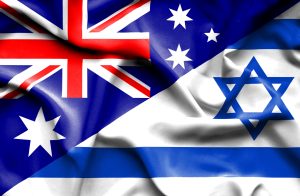The Australian Labor Party’s move to reverse a decision by the previous government to recognize West Jerusalem as the capital of Israel has angered Israeli politicians as well as Zionist groups in Australia, despite the fact it brings Australia into line with much of the world.
The government’s policy change around Jerusalem, which took place during the Jewish holiday of Simchat Torah, was said to take Israel by surprise.
The Israeli government called the decision “deeply disappointing” and summoned the Australian ambassador. In a statement, Prime Minister Yair Lapid said, “In light of the way in which this decision was made in Australia, we can only hope that the Australian government manages other matters more seriously and professionally.”
Nonetheless, the decision should come as no surprise. The original proposal to move the Australian embassy to West Jerusalem and recognize it as Israel’s capital was made by former Prime Minister Scott Morrison in the shadow of a similar move by then U.S. President Donald Trump. It was strongly believed at the time to be a cynical ploy to win over the voters in the affluent Sydney suburb of Wentworth – which has a large Jewish population.
While the announced moving of the Australian embassy in Israel never took place, the recognition remained contentious – only Kosovo, Honduras, Guatemala, and the United States have their embassies in Jerusalem.
Australian Foreign Minister Penny Wong told a press conference on Tuesday that “today, the government has reaffirmed Australia’s previous and long-standing position that Jerusalem is a final status issue, a final status issue that should be resolved as part of any peace negotiations between Israel and the Palestinian people.”
The status of Jerusalem is one of the most delicate areas of dispute in the Israeli-Palestinian conflict.
While Israel regards the entirety of Jerusalem as its capital, Palestinians consider East Jerusalem to be the capital of their future state. Israel effectively annexed East Jerusalem in 1980 – which the United Nations declared a “violation of international law” – and it has never been internationally recognized as the capital.
In Australia, the decision to revoke recognition of Jerusalem as the Israeli capital has been met by a slew of strong editorials in the leading’s media outlets, as well as several forceful statements by various Jewish, pro-Israeli affiliations. The Executive Council of Australian Jewry (ECJA) called the decision a “gratuitous insult to a key economic and strategic ally.”
Another, the Australia/Israel & Jewish Affairs Council, told the ABC that the move was “frankly bizarre.” The director of the council, Dr. Colin Rubenstein, went as far as to state that “the reversal also risks denting Australia’s credibility with some of our closest allies.”
The suggested credibility dent won’t come from Indonesia – home to the largest Muslim population in the world and a key Indo-Pacific security partner for Australia – which welcomed the decision.
Jakarta had criticized the 2018 move. Upon Canberra’s reversal, the Indonesian government released a statement outlining their belief that the decision would “contribute positively to Palestinian-Israeli peace negotiations.”
“Indonesia appreciates Australia’s reaffirmation of its commitment to support a peaceful resolution to the conflict based on a two-state solution, within internationally recognized borders,” the statement said.
In the Australian media, one voice has been conspicuously absent in the furor: those of Australian Palestinians. Of the estimated 7,000 members of the small community who reside in Australia, a number have been permanently displaced – refugees who are not able to return to their homeland due to Israel’s denial of their right to return.
Professor Ben Saul, the Challis Chair of International Law at Sydney University, noted his disappointment at the “erasure” of Australian Palestinian voices in the debate. Adam Bandt, leader of the Australian Greens, tweeted that he “welcomed” the reversal and hoped this would lead to Labor recognizing “the state of Palestine.”
Academic and Palestinian community organizer Fahad Ali told The Diplomat that the media coverage of the embassy decisions was a “storm in a teacup.”
“In 2018 there was no equivalent outrage despite the fact the decision went against both international law and a bipartisan relationship,” he pointed out.
The immense interest this time, Ali added, is evidence that the media’s priorities are a “little skewed.”
“While this debate has played out, the United Nations special rapporteur tabled a very serious report. It is mind boggling to see the amount of media attention to a very minor issue as opposed to serious issues that are violations of international law,” he said.
The report, released to the public on Tuesday, stated Israel’s actions against Palestinians in the occupied West Bank amount to “persecution.”
The media furor is partly the result of what Diplomat writer Grant Wyeth highlighted as “Australia’s pleasantly boring politics.” With an election not long gone, there is little to attract media attention in the political sphere – especially after the recent passing of Queen Elizabeth II resulted in a temporary suspension of Parliament.
While this decision by the Labor Party may ruffle some diplomatic feathers, it seems unlikely to fracture the relationship between Australia and Israel in any tangible way. Indeed, the close relationship between Australia and Israel is something that remains at the forefront of many human rights groups’ attention. Australia has in the past rebuked the International Criminal Court for accusing Israel of war crimes, intervening and stating it is beyond the jurisdiction of the ICC.
Meanwhile, Ali despairs that his small community of Australian Palestinians is consistently disrespected when it comes to issues around their homeland.
“Nobody considered how the Australian Palestinian community felt during the original decision. Everyone in the community is angry; nobody thinks out voices are relevant,” he lamented.

































